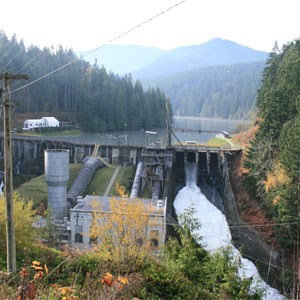
NPS Photo
Even though parks are protected areas, habitat within parks may still need to be restored. In many parks, human activities such as logging, grazing, and mining that occurred long before the park was established can have lasting impacts. Ecosystem management attempts to reverse the effects of human-caused and other disturbances to allow the ecosystem to recover. A variety of habitat restoration projects are underway in parks.
Western pine forests provide great habitat for black and grizzly bears. These habitats are being lost to increased populations of mountain pine beetles. These native bark beetles have coexisted with whitebark and lodgepole pines in the mountains for a long time, but the recent winter warming trend has allowed mountain pine beetles to complete their life cycle in one year rather than two (and thus infest more trees) and also has allowed the beetles to inhabit higher elevations than in the past. Yellowstone and Grand Teton national parks are members of the Greater Yellowstone Coordination Committee's Whitebark Pine Committee. They collect whitebark pine seeds and propagate and plant whitebark pine seedlings with the goal of helping to ensure the long-term viability and function of whitebark pine ecosystems in the Greater Yellowstone Area.
Wildland fires can be a necessary and natural part of some ecosystems. When managed well, fires can increase habitat quality by temporarily increasing food availability. Alternatively, when fire is suppressed, fuels can build up and lead to catastrophic fires that destroy habitat. When this happens, efforts to restore damaged habitat are necessary. National Park Service fire managers work with resource managers in and around parks to take steps that support beneficial fires and avoid damaging ones. When habitat is harmed by fire, fire managers work to restore habitat by stabilizing soils and supporting natural revegetation.
Sometimes habitat restoration for prey species improves bear survival. Olympic National Park is removing dams from the Elwha River to restore populations of salmon and other fish that are important sources of food for bears. The restoration of the river will also restore river hydrology and riparian habitat. The Elwha River dam removal allows scientists to observe first hand the impacts of large landscape restoration on park resources and will provide important data on ecosystem recovery.
Last updated: April 18, 2016
